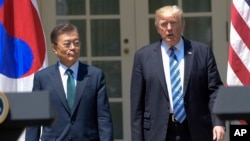U.S. President Donald Trump, who is hosting South Korean President Moon Jae-in, says he hopes to renegotiate an "equitable" trade deal with Seoul.
Sitting alongside Moon at a White House meeting Friday, Trump echoed his frequent complaint that the current agreement with the U.S. ally has been "rough."
"We are renegotiating a trade deal right now with South Korea, and hopefully it will be an equitable deal. It will be a fair deal for both parties. It's been a rough deal for the U.S., but I think that it will be much different and will be good for both parties."
Trump has complained that the U.S. and South Korea have a "one-sided" and "horrible" trade agreement. Since the deal went into effect in 2012, the U.S. trade deficit with Seoul has doubled.
Trade is just one of the potential areas for disagreement that could come up between Trump and Moon.
The two leaders also differ on how to handle North Korea, with Trump preferring maximum diplomatic pressure and Moon preferring engagement with Pyongyang.
Trump said the two leaders "accomplished a lot" on North Korea. "We're also in the process of discussing our frankly many options," Trump said. "We have many options with respect to North Korea.
For his part, Moon said he had "very honest discussions" with Trump about North Korean nuclear issue and "other issues of mutual interest."
Moon is seeking to convince North Korean leader Kim Jong Un to pause his nuclear and missile programs in exchange for restarting talks, which would eventually lead to a complete disarmament.
It isn't clear whether the Trump administration is open to such an approach, or whether Kim would even agree to it. The government in Pyongyang says it considers its weapons programs essential to its survival.
Trump and Moon were also expected to discuss Seoul's deployment of the THAAD U.S. anti-ballistic missile system. After taking office, Moon paused the deployment, pending an environmental review, angering Washington.
That will be part of a wider discussion on U.S.-South Korea defense cooperation. The U.S. has over 28,000 troops stationed in South Korea. Moon has criticized some aspects of that cooperation, and wants to shift operational command of the South Korean military to Seoul.
Trump has also complained about the defense relationship. During the campaign, he regularly said that South Korea and other U.S. allies aren't paying enough for defense protection from the U.S.
However, both sides have indicated those disagreements will not surface publicly this week. Trump on Friday called the relationship "very, very strong." Moon said the visit has provided a chance to "reaffirm that the U.S. and Korea are walking on the same path towards a great alliance."




